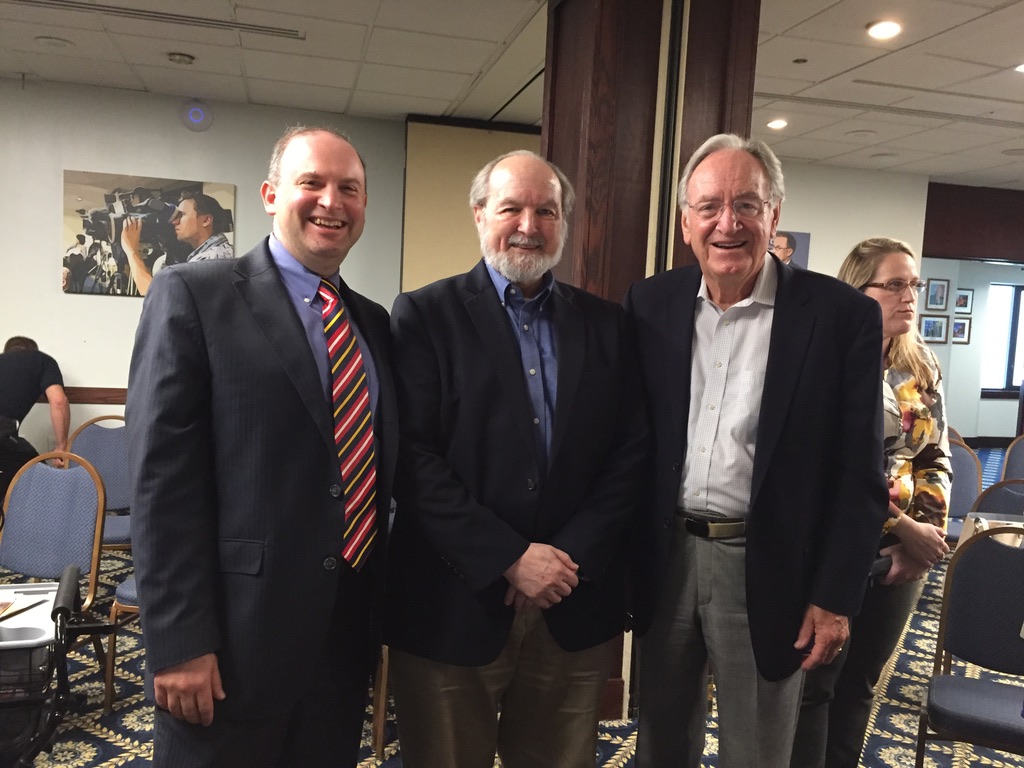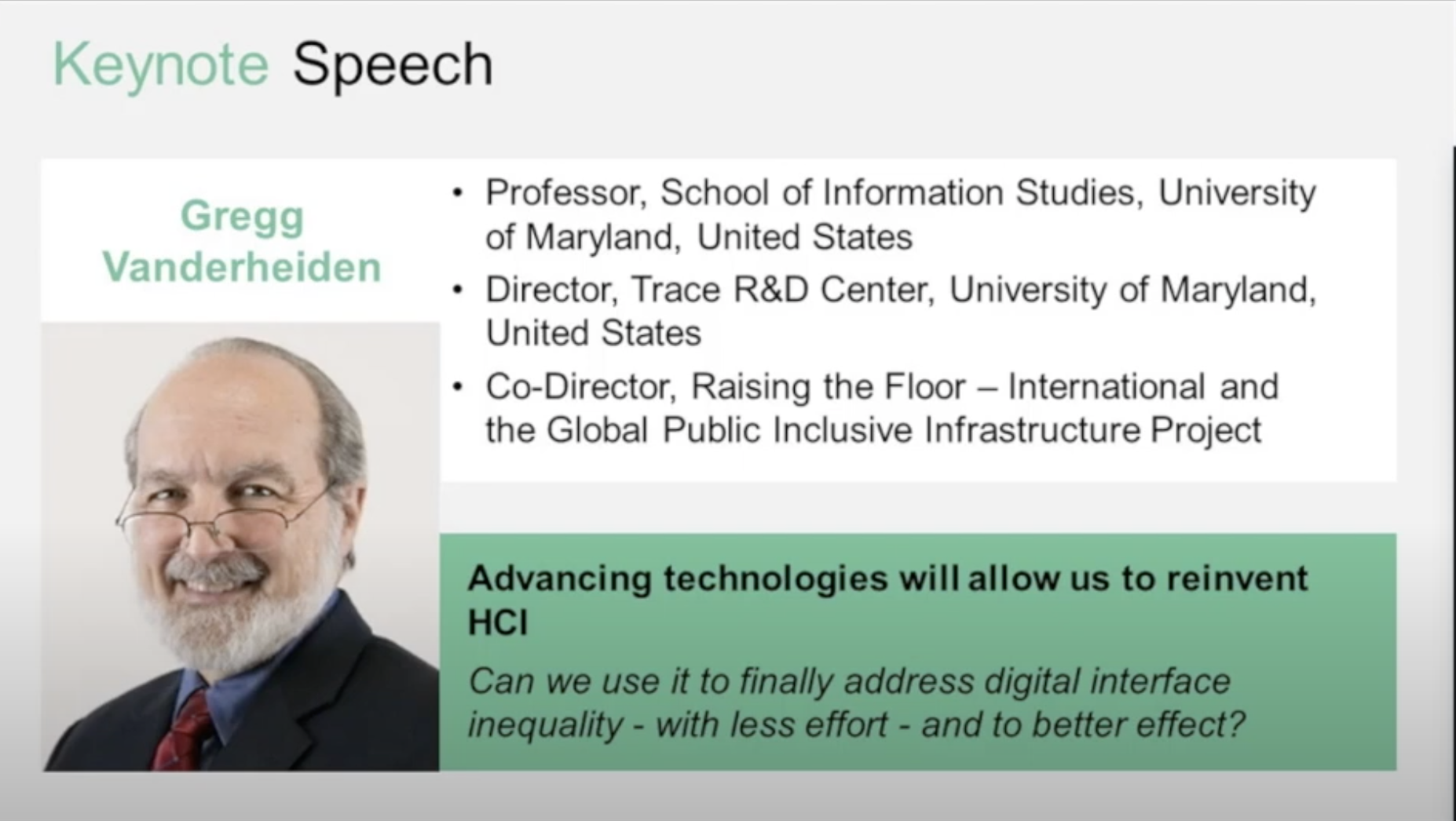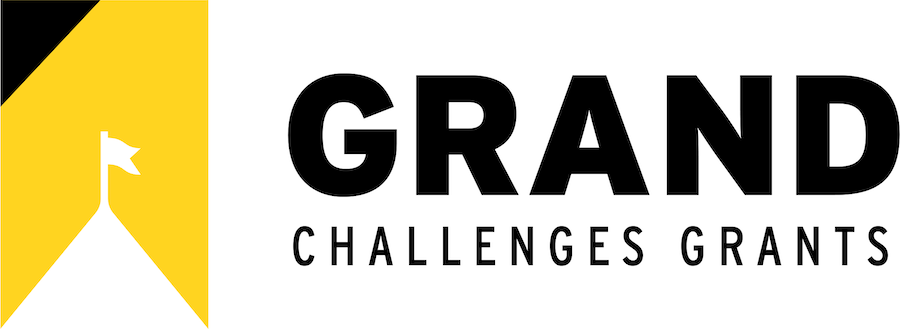Policy and New Legal Frameworks for Accessibility
This work is partially funded by Inclusive Information and Communications Technology RERC (90REGE0008) from the National Institute on Disability, Independent Living, and Rehabilitation Research (NIDILRR), Administration for Community Living (ACL), Department of Health and Human Services (HHS). Learn more about the work of the Inclusive ICT RERC.

Dr. Jonathan Lazar and Dr. Gregg Vanderheiden of the Trace Center and former Senator Tom Harkin (IA), lead author of the Americans with Disabilities Act (ADA)
What is the purpose of this project?
The Trace Center has devoted considerable effort over the years to help ensure that policymakers have the best information to develop policy that allows for maximum accessibility that is also commercially practical—and works across disabilities and for mass market users.
Accessibility law, regulations, and policies are powerful tools that are necessary for actual system change around accessibility. However, rules can also be limiting. It is important that laws, regulations, and policies be well designed to have maximum benefit without limiting the innovation that drives technology forward or the effectiveness of the technology for users who do not have a disability. Properly designed policy and regulations can actually encourage innovation, resulting in more usable interfaces and products for all users of technology and digital content.
In addition to continuing to work on informing the development of technical standards, regulations, and policies, the Center is also expanding its efforts:
- To quantify the impact of accessibility (or lack thereof) to assist policymakers and regulators in decisions about cost-benefit analysis. The goal of this work is to better understand the impact to people with disabilities—both the cost of inaccessible interfaces and the benefits of accessibility.
- To explore the technical and legal aspects of digital accessibility. We are investigating and proposing legal and technical solutions to the existing gaps between digital accessibility laws and regulations (which often don’t acknowledge the actual guidelines and tools and usage) and the guidelines and tools (which conversely don’t acknowledge the laws and regulations).
Our work includes:
- Testifying before legislative committees at the state and federal (U.S. Congress) level.
- Submitting comments and providing information to federal agencies and departments including the Federal Communications Commission (FCC), the U.S. Access Board, the Office of Science and Technology Policy (OSTP), and the Department of Justice ( DOJ).
- Conducting research that informs policies related to the impact of technology accessibility.
- Creating and describing new legal frameworks that more accurately reflect technologies and bridge gaps between technologies and legal requirements.
- Working on new policy directions and strategies both to better address groups underserved today and to address emerging accessibility issues with new technologies.
Trace faculty: Jonathan Lazar, J. Bern Jordan, Gregg Vanderheiden
Trace affiliates: Ursula Gorham, Paul Jaeger, Ana Palla, Brian Wentz
- New Law Ensures Equivalent Access to Digital Tools for All of Maryland’s K-12 Students May 5, 2022
- Online-Only Services Offer Safety, But May Limit Access April 12, 2022
- Telecom RERC Real-Time Text Effort Culminates in FCC Adoption December 20, 2016
- Griffith, M., Wentz, B., & Lazar, J. (2023). Quantifying the cost of web accessibility barriers for blind users. Interacting with Computers. (pp. 1-13) DOI: https://doi.org/10.1093/iwc/iwad004
- Wentz, B., Paliwal, S., Gorham-Oscilowski, U., Jaeger, P., & Lazar, J. (2023). Evaluating the accessibility of digital government services for family law in the U.S. during the COVID-19 pandemic. Proceedings of the 56th Hawaii International Conference on System Sciences (HICSS). URI https://hdl.handle.net/10125/102862
- Lazar, J. (2022). Ableist language in the web accessibility case of Robles v. Domino’s Pizza LLC: When “everyone” doesn’t include people with disabilities. Including Disability, 2022(2), 7-26.
- Lazar, J., & Ferleger, D. (2022,). A reconceptualization of website accessibility under the ADA: Resolving the inter-circuit conflict post-pandemic. Santa Clara High Technology Law Journal 39, 1 (Article 2).
- Lazar, J., Jordan, J. B., & Wentz, B. (2022). Incorporating Tools and Technical Guidelines into the Web Accessibility Legal Framework for ADA Title III Public Accommodations. Loyola Law Review, 68, 305–341.
- Lazar, J. (2022). Managing digital accessibility at universities during the COVID-19 pandemic. Universal Access in the Information Society, 21, 3(pp. 749-765).
- Wentz, B., Lazar, J., Jaeger, P. T., & Gorham, U. (2021). A socio-legal framework for improving the accessibility of research articles for people with disabilities. Journal of Business & Technology Law, 16 (pp. 223-257, No. 3). Baltimore, MD: University of Maryland Carey School of Law.
- Griffith, M., Wentz, B., and Lazar, J. (2020). Measuring the time impact of web accessibility barriers on blind users: A pilot study. In P. Langdon, J. Lazar, A. Heylighen, and H. Dong (Eds.), Inclusive Design: Looking towards the Future (pp. 153-160). London: Springer-Verlag.
- Lazar, J. (2019). Segregated ballots for voters with disabilities? An analysis of policies and use of the ExpressVote Ballot Marking Device. Election Law Journal, 18 (pp. 309-322).
- Lazar, J. (2019). Web accessibility policy and law. In Y. Yesilada and S. Harper (Ed.), Web Accessibility: A Foundation for Research (2nd ed.) (pp. 247-261). London: Springer-Verlag.
- Lazar, J. (2019). The potential role of US consumer protection laws in improving digital accessibility for people with disabilities. The University of Pennsylvania Journal of Law and Social Change, 223 (pp. 185-204).
- Lazar, J. (2019). The use of screen reader accommodations by blind students in standardized testing: A legal and socio-technical framework. The Journal of Law & Education, 48 (2, pp. 185-213).
- Kaika, E., Alonso-Mendoza, E., Collins, S., Arcia, K., Farinha, S., Hill, M., Soukup, C., Sonnenstrahl, A., Schuck, J., Lewis, T., Kelley, B., Harlin, D., Rosenblum, H., Wyvill, J., McCartin, E., Grieser, S., McKay-Cody, M., Vanderheiden, G., Vogler, C., & Behn, G. (2022). Comments in the matter of Implementing the Infrastructure Investment and Jobs Act: Prevention and Elimination of Digital Discrimination. (GN Docket No. 22-69): FCC.gov.
- Reid, B. E., Kaika, E., Collins, S., Arcia, K., Hill, M., Soukup, C., Raimondo, B., Sonnenstrahl, A., Kelley, B., Woodfill, C. C., Rosenblum, H., Wyvill, J., Lachman, B., McCartin, E., Grieser, S., McKay-Cody, M., Vogler, C., Vanderheiden, G., & Behn, G. (2022). Comments in the matter of Media Bureau Seeks to Refresh the Record on Accessibility Rules for Closed Captioning Display Settings Under the Television Decoder Circuitry Act. (MB Docket No. 12-108): FCC.gov.
- Reid, B. E., Kaika, E., Alonso-Mendoza, E., Collins, S., Roldan, S., Arcia, K., Farinha, S., Hill, M., Soukup, C., Crumrine, A., Sonnenstrahl, A., Kelley, B., Harlin, D., Rosenblum, H., Niyongabo, I., Lachman, B., Wong, W., McCartin, E., Reininger, J., Grieser, S., Schuck, J., Vogler, C., Vanderheiden, G., & Behn, G. (2022). Comments in the matter of Implementation of Sections 716 and 717 of the Communications Act of 1934; Consumer and Governmental Affairs, Media, and Wireless Telecommunications Bureaus Seek Update on Commission’s Fulfillment of the Twenty-First Century Communications and Video Accessibility Act. (CG Docket No. 10-213; GN Docket No. 21-140): FCC.gov.
- Reid, B. E., Kaika, E., Alonso-Mendoza, E., Collins, S., Arcia, K., Hill, M., Soukup, C., Crumrine, A., Sonnenstrahl, A., Kelley, B., Harlin, D., Rosenblum, H., McCartin, E., Grieser, S., Schuck, J., Vogler, C., & Vanderheiden, G. (2022). Comments in the matter of Implementation of Sections 716 and 717 of the Communications Act of 1934; Rates for Interstate Inmate Calling Services; Consumer and Governmental Affairs, Media, and Wireless Telecommunications Bureaus Seek Update on Commission’s Fulfillment of the Twenty-First Century Communications and Video Accessibility Act. (CG Docket No. 10-213; WC Docket No. 12-375; GN Docket No. 21-140): FCC.gov.
- Kaika, E., Collins, S., Arcia, K., Farinha, S., Hill, M., Raimondo, B., Sonnenstrahl, A., Kelley, B., Rosenblum, H., Wyvill, J., Lachman, B., McCartin, E., Grieser, S., Vogler, C., & Vanderheiden, G. (2022). Comments in the matter of Amendment of Part 11 of the Commission’s Rules Regarding the Emergency Alert System. (PS Docket No. 15-94): FCC.gov.Kaika, E., Lachman, B., Sonnenstrahl, A., Rosenblum, H., Vogler, C., Hill, M., Tucker, N., Brown, R., Crumrine, A., Niyongabo, I., Herson, K., Vanderheiden, G., Farinha, S., Collins, S., & Kelley, B. (2021). Comments in the matter of COVID-19 Telehealth Program Application Evaluation Metrics. WC Docket No. 20-89: FCC.gov.
- Kaika, E., Bader, A. C., Arcia, K., Farinha, S., Hill, M., Raimondo, B., Sonnenstrahl, A., Kelley, B. Rosenblum, H., Collins, S., Lachman, B., McCartin, E., Webb, J., Vogler, C., & Vanderheiden, G. (2021). Comments in the matter of Amendment of Part 11 of the Commission’s Rules Regarding the Emergency Alert System. PS Docket No. 15-94; PS Docket No. 15-91: FCC.gov.
- Mankoff, J., Kasnitz, D., Camp, L. J., Lazar, J., & Hochheiser, H. (2021). Areas of Strategic Visibility: Disability Bias in Biometrics: Response to Notice of Request for Information (RFI) on Public and Private Sector Uses of Biometric Technologies. (86 FR 56300, Doc. No.: 2021-21975). Washington, DC: Office of Science and Technology Policy.
- Reid, B. E., Kelley, B., Hamlin, L., Kaika, E., Rosenblum, H., Brown, R., Waldo, J., Hill, M., Sonnenstrahl, A., McAnallen, R., Lachman, B., Vogler, C., Kozma-Spytek, L. & Vanderheiden, G. (2021). Comments in the matter of Telecommunications Relay Services and Speech-to-Speech Services for Individuals with Hearing and Speech Disabilities. (CG Docket No. 03-123): FCC.gov.
- Reid, B. E., Moy, L., Kaika, E., Brown, R., Waldo, J., Farinha, S., Hill, M., Soukup., C., Raimondo, B., Crumrine, A., Sonnenstrahl, A., Kelley, B., Hamlin, L., Lewis, T. A., Kraus, K., Wyvill, J. C., Rosenblum, H., Lachman, B., McCartin, E., Webb, J., Vogler, C., & Vanderheiden, G. (2021). Comments in the matter of Consumer and Governmental Affairs, Media, and Wireless Telecommunications Bureaus Seek Update on Commission’s Fulfillment of the Twenty-First Century Communications and Video Accessibility Act (GN Docket No. 21-140): FCC.gov.
- Kaika, E., Lachman, B., Brown, R., Rosenblum, H., Alkebsi, Z., Hill, M., Collins, S., Sonnenstrahl, A., Kelley, B., Crumrine, A., Farinha, S., & Vanderheiden, G. (2020). Comments on implementation of Section 716 and 717; tentative findings for the 2020 biennial report to Congress required by the Twenty-First Century Communications and Accessibility Act of 2010. CG Docket 10-213: FCC.gov.
- Lazar, J. (2022). Testimony on Accessible Federal Technology for People with Disabilities, Older Americans, and Veterans: Hearing before the U.S. Senate Special Committee on Aging, 117th Cong. (July 28, 2022), p. 95-101. https://www.govinfo.gov/content/pkg/CHRG-117shrg49440/pdf/CHRG-117shrg49440.pdf
- Lazar, J. (2022, Feb. 16). Testimony on SB 617, The Equivalent and Nonvisual Access Accountability Act for K-12 Education (Maryland State Senate Education, Health, and Environmental Affairs Committee): Maryland General Assembly.
- Lazar, J. (2021, Feb. 18). Testimony to the Senate Education Health and Environment Committee in support of SB 271, Election Law – Voting Systems – Accessibility for Voters With Disabilities.
- Lazar, J. (2020, Mar. 3). Testimony to the Senate Education, Health and Environmental Affairs Committee in support of SB 757, Election Law – Voting Systems – Accessibility for Voters With Disabilities.
Managing Digital Accessibility at Universities During the Covid-19 Pandemic
Jonathan Lazar presented this work in a Google Tech Talk in February, 2021
Accessibility for Passengers with Sensory and Cognitive Disabilities
Gregg Vanderheiden presents on Cognitive Access to Autonomous Vehicles at the US Access Board’s Fourth Public Forum on Inclusive Design of Autonomous Vehicles, Apr 21, 2021

Advancing Technologies Will Allow Us to Reinvent HCI
Gregg Vanderheiden gave the keynote address at Human Computer Interaction International (HCII conference) in 2020, with a focus on the need for a new technical and policy approach to accessibility.




